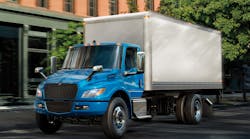Global truck manufacturer Traton SE, which includes the International truck brand among its portfolio, has added more than $1 billion to its investment plans in electric mobility research and development.
Munich-headquartered Traton, which last year acquired Navistar and also owns the Scania and Man brands among others, now plans to put to work €2.6 billion (about $2.9 billion at current exchange rates) between now and 2026 on developing and refining alternative drivetrains. That’s up from the €1.6 billion it had previously looked to invest by the end of 2025 and some of those additional funds will be taken from the company’s work on conventional drives.
See also: Navistar chief talks future of truck technology
“These drives are clearly the greenest, fastest, and most affordable solution for our customers, even for long-haul transportation, although hydrogen may prove to be a useful addition in certain niches,” CEO Christian Levin said in a statement. “Since trucks are charged primarily during peaks in supply and troughs in demand, even the power load on the grid is moderate.”
Levin and his team are looking to have half of the trucks it sells be zero-emission by 2030. To help fund the infrastructure for that growth, Traton late last year signed a joint venture agreement with peers Daimler Truck and the Volvo Group to spend €500 million to build a European network of at least 1,700 public chargers for battery-electric heavy-duty trucks and buses. The companies set a five-year target to meet that goal.
Traton last year booked orders for 1,717 electric vehicles, with more than 1,000 of those being for Man electric vans.
The leaders of Traton on March 16 also reported 2021 unit sales of nearly 272,000, which was up more than 40% thanks mainly to the acquisition of Navistar and its International brand. (Without Navistar, orders would have risen 3%.) Orders rose even more quickly to nearly 360,000 but supply chain snarls limited the company’s ability to churn out all those bookings. Traton reported an adjusted operating profit of €1.6 billion on revenues of €30.6 billion.
Levin and his lieutenants said after reporting Traton’s numbers that the company generates less than 5% of its business in Russia and Ukraine and that it has no plants in Ukraine and just one in Russia, in St. Petersburg. But they added that the company’s supply chain is being affected and that it’s not yet possible to say with much confidence that the medium-term impact of Russia’s invasion of Ukraine will be on suppliers. For that reason, they said their 2022 forecast for large sales and profit increases comes with a pretty high level of uncertainty.
The Frankfurt-listed shares of Traton (Ticker: 8TRA) rose about 3% on March 16. They have however fallen about 25% in the past six months.




